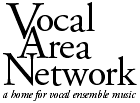 |
 |
Advertise | Sustaining Membership | VAN Store | Feedback
by Stephen Black for Vocal Area Network
Posted November 11, 2006
 There
are many concerts in New York City each weekend to choose from, and often quite
a few concerts featuring new music. Most new music concerts are organized by
performances of the music of a single composer, or by genre (i.e. sacred or
secular, music for theater, etc). This applies to vocal music concerts as well
as purely instrumental concerts. However, occasionally there is a new music
vocal concert in which the pieces on the program are organized according to a
common textual theme. This is arguably the most difficult method of organizing a
concert, and only a handful of choral conductors in New York City have received
critical acclaim for this ability. They include Clara Longstreth, conductor of
the New Amsterdam Singers, Mark Shapiro, conductor of Cantori, and Harold
Rosenbaum, conductor of Canticum Novum and the New York Virtuoso Singers.
There
are many concerts in New York City each weekend to choose from, and often quite
a few concerts featuring new music. Most new music concerts are organized by
performances of the music of a single composer, or by genre (i.e. sacred or
secular, music for theater, etc). This applies to vocal music concerts as well
as purely instrumental concerts. However, occasionally there is a new music
vocal concert in which the pieces on the program are organized according to a
common textual theme. This is arguably the most difficult method of organizing a
concert, and only a handful of choral conductors in New York City have received
critical acclaim for this ability. They include Clara Longstreth, conductor of
the New Amsterdam Singers, Mark Shapiro, conductor of Cantori, and Harold
Rosenbaum, conductor of Canticum Novum and the New York Virtuoso Singers.
The St. Joseph's Singers adventurous concert on Sunday, November 12 is an hour-long exploration of new music, and the title of the program, "Sequestered Places," reflects the theme of the concert. The program, conducted by Music Director Stephen Black, features the music of six living composers and four compositions written since 2000, including three New York City premieres -- one of which is a work commissioned by the St. Joseph's Singers specifically for this concert. This alone makes the program remarkable, but what is even more interesting is that all the works selected for the program share a common textual theme, and that is the departure from one world to another, whether it is the departure of a person from life to death, or the departure of persecuted families from World War II Europe to America, or the descent of a messianic Savior to an expectant people.
Featured works include the New York City premiere of Four Poems of A. R. Ammons for baritone soloist and instrumental ensemble by Pulitzer Prize-winner Steven Stucky. The work is scored for the romantic ensemble of baritone and six mostly low instruments, and the texts were chosen by the composer to fit the sound world he envisioned for the composition. All the poems concern death, in particular the departure of a person from the earth to another world -- a world the poet A. R. Ammons calls the "wide open."
Also on the program is a suite of music from the opera-theatre piece Darkling by Stefan Weisman. Darkling was commissioned by American Opera Projects and premiered in March 2006, receiving enthusiastic critical acclaim from The New York Times, Time Out New York and many other media outlets. In the words of book critic Jessica Myers Schecter the work "is a curious amalgamation of music and drama interwoven with pre-recorded poetry, soundscape, film footage, and projected images. The poetry on which the work is constructed was inspired by the discovery of an abandoned shoebox poet Anna Rabinowitz found on a shelf in her parents' house. Filled with old photographs and letters, the contents of the box were all that remained of two families killed in the Holocaust. In an effort to give these absent ancestors voice, Rabinowitz wrote a book-length poem entitled Darkling."
The experimental production of Darkling was performed in a three-sided theater on Manhattan's Lower East Side. In director Michael Comlish's conception all the action takes place behind a black scrim box so that the performers appear to be contained within the widely spaced bars of a prison. Images of translated letters, photographs, lines from Darkling poem and video footage from the '20s and '30s are projected onto the scrim barrier. The poem itself is an assemblage of many elements, including the imagined voices of individuals who departed Europe for America, as well as the voices of relatives left behind. Weisman's music, used throughout the whole production except for a postscript by Lee Hoiby, is similarly contained in its structure, and is often effectively halting in its delivery. More than one reviewer has cited the influence of Shostakovitch and Jewish folk music in the score, though much of the tartness is certainly unique to Weisman.
Other New York City premieres on the program include O frondens virga for a cappella women's chorus by New York City composer Neil Farrell (commissioned by SJS for this concert), and Rorate coeli for a cappella mixed chorus by Kristin Kuster, winner of the 2004 American Composers Orchestra Whitaker New Music Readings. The cost of the concert is $20 general admission, $15 students and senior citizens. Tickets are available online at the chorus website www.sjsingers.org. The program will be performed in the acoustically splendid sanctuary of St. Joseph's Church Yorkville, located on the Upper East Side of Manhattan at 404 East 87th Street (at First Avenue).
Stephen Black directs the St. Joseph's Singers.